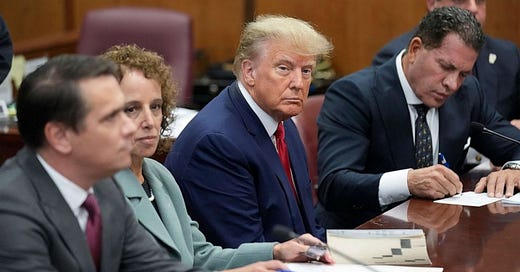There will not be a pivot
People asking when Republicans will turn away from Trump are asking the wrong question
After his testimony in the Fulton County case against Donald Trump, former Georgia Lt. Gov. Geoff Duncan (R) said that the sweeping indictments presented a "pivot point" for the Republican Party. Some New Hampshire Republicans are counting on the state primary’s quirky history of boosting underdogs to change the dynamics of the race, with Gov. John Sununu saying, “I’m hoping that most people come to their senses.” Recently, NBC Meet the Press host Chuck Todd noted that when a trial starts right before the Iowa caucuses, “I think that all of a sudden Republicans are going to ask themselves, ‘What are we doing?’” There’s a perpetual sense that this (Access Hollywood, Charlottesville, January 6th, the 2022 midterms, the Georgia indictment) will be the moment that they turn on him. Pundits have been waiting for some kind of “pivot” to occur since Barack Obama promised that his 2012 re-election would cause Republican’s “fever” to break… probably longer.
Folks, this is not going to happen. And it’s not for want of knowledge or media coverage, and it’s not due to some kind of mass delusion or mental illness. People waiting for the “fever” to break or for the party to return to “normal” are examining it through the wrong lens. But it’s the only lens “establishment” figures and pundits in Washington have.
Here’s what I think is a more useful framework: there is a populist, nativist faction within the modern Republican Party that has a long, long history in the United States but has rarely controlled a major party. It has championed candidates like George Wallace in 1968, Pat Buchanan in 1992, and others who advocate for strict limits or even the elimination of immigration and have a distinct white conservative Christian worldview they seek for national politics.
Importantly, they have often felt slighted, and they’ve not always been wrong to feel this way. For decades, Republican leaders in DC made modest overtures to them but never really wanted them in charge. Yes, they’d share some of their cultural claims on abortion and guns, but party leaders like Reagan, Bush, Romney, McCain, and others would still favor some sort of immigration and would leave this faction feeling used or ignored. The faction was put down for years by party leaders who told them that some of their views had merit, but only through moderation could they win national office; sometimes that worked, sometimes it didn’t. The populists complained, but they just didn’t have the numbers to take over the party.
And then Trump came along.
Trump was exactly what most party leaders in DC had been trying to keep out of power. He wasn’t committed to the conservative program. He wasn’t respectful of party traditions. He threatened to blow up the fragile coalition they’d crafted. But he also championed the populist faction, and thanks to his own popularity independent from politics, he was able to turn that minority faction into a majority. He was what the populists were told they couldn’t have, because it would cost the party dearly. Instead, he put their faction in charge, and they won the White House.
Now, of course, the Republicans who were prominent in politics before Trump came to town — Lindsey Graham, Mitt Romney, Paul Ryan, the beneficiaries of the Reagan-Bush coalition, etc. — recognize that the faction that brought them into power is no longer in charge. They’ve adapted in their own ways, with some leaving Washington, and others rapidly changing their tunes. But they describe Republican politics to DC pundits, especially off the record, in a particular kind of head-hanging, sighing manner. The party has lost its head, but it’s temporary, and they’re doing what they can until cooler heads are back in charge.
But they’re the minority faction. The folks who run the party now are the populist grassroots outside DC. They decide who gets nominated for office and who doesn’t. They don’t see this as a temporary madness; they see this as the movement that put them in charge and actually cares about the things they care about. They don’t see any need to “snap out of it”; that concept doesn’t make sense to them. Indeed, calling for them to snap out of it is essentially asking them to give power back to the previous faction that never took them seriously in the first place. Why would they want to do that? They’re in charge, and as far as they’re concerned they’re winning.
So no, they’re not going to abandon the guy who put them in power. Not even if he’s convicted, not even if he’s in prison. And yes, that means the country has a potentially awful election year coming up, in which the nation’s official institutions have deemed one party’s leader guilty and sentenced him and the nearly half the country considers those institutions illegitimate. It is a toxic, tragic, and potentially violent cocktail.
Now, to be clear, just because I’m saying Trump’s supporters won’t pivot away from him doesn’t mean he’s guaranteed to be the nominee. He could bow out. Obviously that’s not his preference or consistent with his personality, but defending oneself in at least four different courtrooms simultaneously requires more bandwidth and resources than even an insomniac billionaire has. Running for president is already a full-time job even when you’re not being prosecuted. He might just decide there’s no way to do all this and run for office. And more than a few of his rivals have floated the idea of pardoning him from federal prosecution anyway.
But if he does decide to bow out, it won’t be because his supporters abandoned him.






I think only 25-30% of the country would view his being in prison to be illegitimate. That's disturbingly high, but it's not a 50/50 situation.
I agree with this analysis. But it is NOT HALF THE COUNTRY. More like 25-30%.